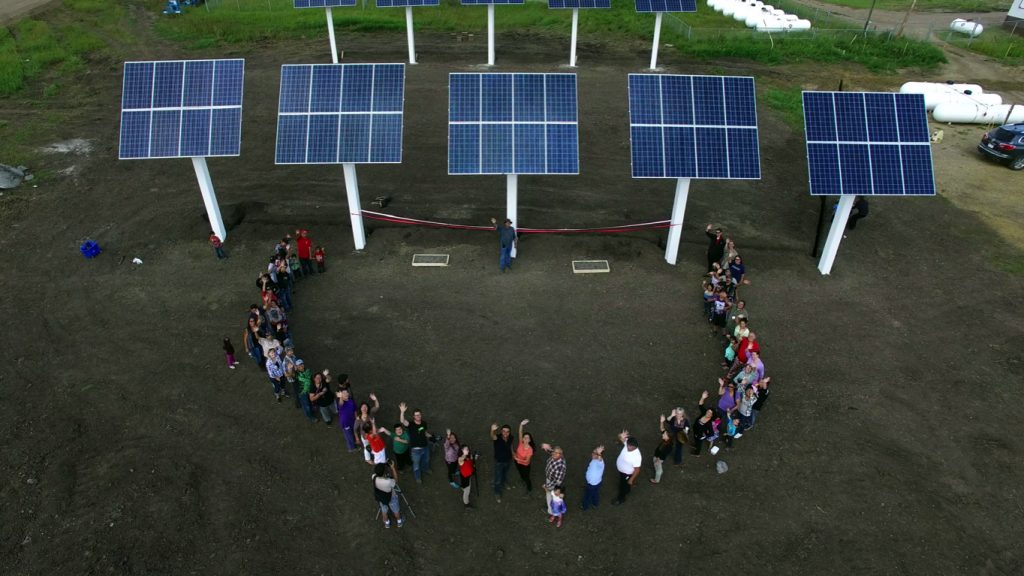Presentations
In this second session, we talked about community-controlled or co-operative energy generation projects. Our guest speaker for this session was Melina Miyowapan Laboucan-Massimo, a member of the Lubicon Cree First Nation in Alberta, Canada, and the founder of a pioneering solar generation project, owned by the First Nation. Watch this 3-minute video to catch a glimpse of the project.
For the following 16-minute talk, we asked Melina to tell us about how the project came about, its challenges and plans, and its contribution to First Nations rights and sovereignty.
What makes an energy cooperative?
While Melina’s community energy project is owned by the Council of her Nation, there are a myriad forms for community control of energy. In some, their members provide the co-operative’s start-up cash. In others, the members are its workers. Trade Unions for Energy Democracy have written up a great (but not exhaustive) summary of these variations, with examples. We reproduce it here in full for your reference.
As TUED put it,
“Knowing more about a cooperative’s institutional form may help us assess whether it is likely to become just another capitalist firm, or to stay accountable to a wider community and/ or its workers.”
We recommend reading TUED’s analysis in their report here.
Glossary
Co-operative: a jointly-owned and democratically-controlled enterprise. The International Co-operative Alliance defines founding values of co-operatives as self-help, self-responsibility, democracy, equality, equity and solidarity. In the tradition of their founders, co-operative members believe in the ethical values of honesty, openness, social responsibility and caring for others. (More from the ICA.) Not all community energy projects are technically co-operatives.
Some useful terms which appear in Melina’s talk:
Power purchase agreement is a long-term contract to buy the electricity generated by a renewable energy installation. (source)
Feed-in tariffs are schemes for long-term power purchase agreements between renewable energy installations and the electricity grid. They usually involve 1) guaranteed grid access, 2) long-term contracts, and 3) purchase prices based on cost of the technology (e.g. solar is more expensive to install than wind, so will receive a higher tariff). (Wikipedia lists feed-in tariff measures around the world.)
Webinar
The webinar featured contributions from
M. Derya Tarhan, community energy organiser and researcher in Toronto, Canada
Duygu Kutluay, renewable solutions campaigner, Greenpeace MED, Turkey
Examples of community renewable projects
Lubicon Solar project website:http://www.lubiconsolar.ca
‘Development of Small Hydro Projects in the Philippines: ROMELCO’s Catingas Mini-Hydro and RE-Diesel Hybrid Projects’ by Grace C Yeneza (slide presentation) http://www.irena.org/EventDocs/S4_GraceYeneza_Presentation_GSYENEZA_IRENA_SIDS_Workshop.pdf
‘Microhydro in Capintalan’ by Shubert L. Ciencia, Philippine Movement for Climate Justice http://climatejustice.ph/main/wp-content/uploads/2014/06/Microhydro-Capintalan-Case-Study.pdf
Solar Gardens in Minessota, UShttp://www.cleanenergyresourceteams.org/solargardens
Earthworker Cooperative, Australia – umbrella co-operative that also installs solar in homes http://earthworkercooperative.com.au/social-justice-and-a-just-transition/
Westmill Solar coop, the UK’s the largest community solar farm http://www.westmillsolar.coop
‘The story of Spain’s first energy cooperative’, by 350.org https://350.org/the-story-of-the-first-spanish-renewable-energy-cooperative/
Further reading
‘Power to the People: Toward democratic control of electricity generation’ by Trade Unions for Energy Democracy http://unionsforenergydemocracy.org/wp-content/uploads/2015/06/TUED-Power-to-the-Peoplefinal.pdf
‘Providing clean energy and energy access through cooperatives’. A report by the International Labor Organisation http://www.uwcc.wisc.edu/pdf/Providing%20clean%20energy%20through%20cooperatives.pdf
‘The value of cooperatives in rural electrification’ by Annabel Yadoo and Heather Cruikshank. Review article including a case study of a Nepali rural electric cooperative, to explore the role that local cooperatives can play in extending electricity access. http://www.indiaenvironmentportal.org.in/files/Energy%20Policy.pdf
Communities of energy (Economic Anthropology) http://onlinelibrary.wiley.com/doi/10.1002/sea2.12050/abstract
Proyectos de energización con fuentes de energías renovables en comunidades rurales chilenas como facilitadores del desarrollo local http://www.riedesarrollo.org/memorias/2013/mesas/mesa7/7.II.1%20Roberto_Proyectos%20de%20energizacion%20con%20fuentes%20de%20energias%20renovables.pdf
The Community Power Report’s resource list has a comprehensive listing of resources on community energy issues in Canada, UK, the US, and Australia. Their news section includes projects in other countries also. http://www.communitypowerreport.com/p/resources.html
‘Danish Wind Energy’ – a history of Denmark’s wind turbine owner ‘guilds’ that own 15% of Denmark’s grid http://www.spok.dk/consult/reports/danish_wind_energy.pdf
‘How three families created a movement and boosted an industry’ – how Denmark’s wind turbine guilds began http://www.feasta.org/2014/06/22/from-our-archives-how-three-families-created-a-movement-and-boosted-an-industry/
Factsheet on community owned energy in Canada: https://www.pembina.org/reports/community-owned-re-fact-sheet.pdf
‘Citizens’ participation in the Energiewende’ – on energy cooperatives in Germany: https://www.cleanenergywire.org/factsheets/citizens-participation-energiewende
‘The rise of solar co-ops’ in Australia http://www.theaustralian.com.au/business/business-spectator/the-rise-of-solar-coops/news-story/d0268670c3d4bf99138acdfc174ef4bf
Smart Microgrids as a Solution for Rural Electrification: Ensuring Long-Term Sustainability Through Cadastre and Business Models http://ieeexplore.ieee.org/document/6841621/
Typology of centralised and decentralised visions for electricity infrastructure http://www.sciencedirect.com/science/article/pii/S0957178716300819
French policy localism: Surfing on ‘Positive Energie Territories’ http://www.sciencedirect.com/science/article/pii/S0301421514006703
To continue the Democratising Energy Peer Learning Course:
- Session 3: State control – National and municipal
- Session 4: Labour and trade unions in the energy transition
- Session 5: Energy poverty and access
- Session 6: Technology for the energy transition
